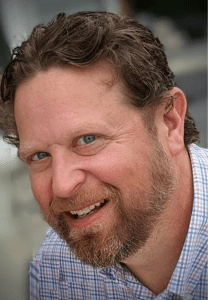The success of the PopEd program depends on our volunteer Trainers’ Network. This group of nearly 700 educators facilitate PopEd workshops in their local areas, inspiring the teaching of population and global challenges in K-12 classrooms. The enthusiasm, expertise, and energy of our trainers is what makes our program run and ultimately, what moves us all closer to a sustainable world.
 Every year, we honor a trainer who has stood out among the rest – someone who goes above and beyond in their efforts to support the PopEd program. This year, we’d like to congratulate Howard Aprill for being PopEd’s ‘Most Valuable Trainer’ (MVT) of 2022. Howard is a Naturalist at the Wehr Nature Center with Milwaukee County Parks (WI), where he conducts environmental education and interpretation programs for all ages. And it’s not only PopEd that appreciates Howard’s contributions to the world of environmental education – in 2019, he was honored as Master Front-line Interpreter by the National Association for Interpretation (NAI).
Every year, we honor a trainer who has stood out among the rest – someone who goes above and beyond in their efforts to support the PopEd program. This year, we’d like to congratulate Howard Aprill for being PopEd’s ‘Most Valuable Trainer’ (MVT) of 2022. Howard is a Naturalist at the Wehr Nature Center with Milwaukee County Parks (WI), where he conducts environmental education and interpretation programs for all ages. And it’s not only PopEd that appreciates Howard’s contributions to the world of environmental education – in 2019, he was honored as Master Front-line Interpreter by the National Association for Interpretation (NAI).
For the ten years he’s been a part of the Population Education Trainers Network, Howard has always been eager to present, willing to step out of his comfort zone, and endlessly enthusiastic in his delivery of PopEd materials. We had a chance to catch up with Howard to hear what has inspired him along his PopEd journey and to get peek into some of his most memorable PopEd experiences.
Q: How did you discover and begin using PopEd materials?
Howard Aprill: It was a chance encounter. Over 20 years ago I found an old PopEd newsletter at work. While perusing the contents, I came across the Population Circle activity. I thought, “Wow, this is simple yet powerful.” I began incorporating that activity with pre-service teachers immediately. I didn’t go through the Facilitator Training right away, but I used Population Circle for years with many audiences.
Q: What made you want to become a PopEd trainer?
HA: In college I started as a Fisheries and Wildlife Management major. However, I increasingly grew interested in the human dimensions of wildlife management and our relationships with natural resources. Over time, an idea started to coalesce that the challenges faced by wildlife, along with a mounting natural resource scarcity, were BOTH related to human population. Ironically, I don’t recall any professor or class ever coming right out to discuss or explore that connection directly: It was danced around, implied, and intimated, but never discussed or explored head-on. Fast forward years later to when I became acquainted with the PopEd materials. That’s when I said, “This is it! Finally, materials and methods to explore human population and their connection to everything.
Q: What is your favorite PopEd lesson plan?
HA: Population Circle, of course! It was my first introduction to PopEd and is still part of EVERY workshop I lead to this day. Of course, I share with my audiences that I’ve been using that lesson for a while. When I started out, world population was coming up on 6 billion. The lesson plan is now updated to reflect a global population of 8 billion.
Q: What educator groups are your favorite to train?
HA: I really enjoy sharing PopEd at teacher conventions and conferences. How rewarding to share lessons and materials to existing teachers, who in turn might use those materials within days or weeks with their own students. To be a conduit of PopEd materials to front-line educators is immensely satisfying.
Q: What is your most memorable experience or presentation as a PopEd trainer?
HA: I was presenting Take a Stand with pre-service teachers at a local university. This lesson is designed to generate discussion, and generate discussion it did! It became quickly apparent that this audience reflected beliefs from one end of the spectrum to the other. Consequently, the discussion was animated, dynamic, and took longer time than originally allocated. However, it was always respectful. After hearing additional information and perspectives, some students actually modified their stance. It was a wonderful microcosm of give-and-take and a model for the rest of society.
Q: Any specific tips or ideas on using PopEd materials or presenting PopEd workshops?
HA: Don’t be afraid to step out of your comfort zone. Present a new lesson you are not familiar with. Years ago, I was asked to present at a math teacher convention. At first, I was hesitant, but am so glad I took a chance. Now, math teachers are some of my favorite audiences, and the Population Riddles lesson plan is among my favorites.
A big thank you to Howard, and to all of our trainers, who make PopEd come to life all over the U.S. and Canada!


